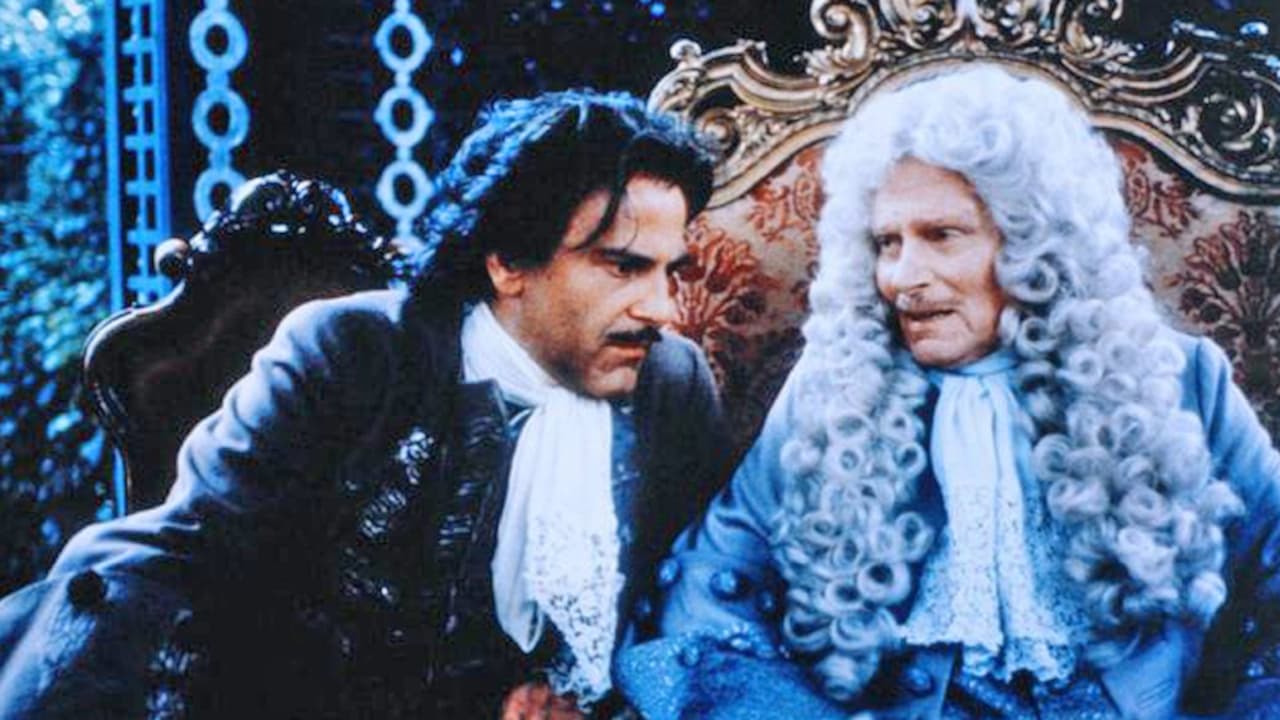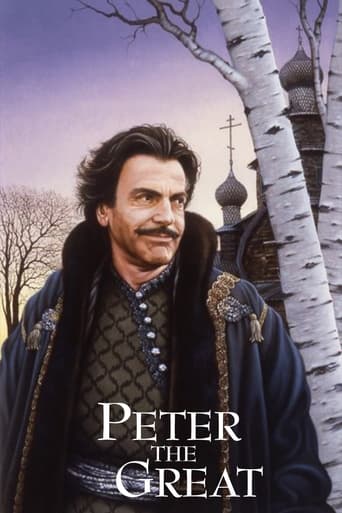

For me Peter the Great was excellent. It is the kind of topic and life that the mini-series concept was invented. It would take six hours to go into both the policy achievements of his reign and the various struggles for power with all the intrigue surrounding them during his reign.Peter Romanov, Peter the first of Russia was born to Czar Alexis who was the second Czar under the new Romanov dynasty. Alexis had two wives and Peter was born to his second wife. Alexis had several children by both wives, but only two sons, one by each wife. Peter was clearly the one with the abilities and personality to rule, but Ivan who most charitably can be described as a dullard, but dullards have their uses if they can be manipulated by ambitious people. Maximilian Schell plays Peter as an adult and the mini-series allows him to develop all facets of his character. The western quarter of Moscow intrigued him, the foreign colony where people dressed so differently and seem to be always innovating. His Russia resisted all change be it technological, be it fashion, be it in its special brand of Christianity the Russian Orthodox Church. Because of that they were hemmed in and he decided things had to change. He meets resistance with those with a built in interest for resistance and the general inertia. But before he's done he has a modern army and navy, a new capital and functioning seaport on the Baltic named St. Petersburg, and certain changes in fashion come to at least the intelligentsia of the regime.But history has its ironies and Peter who won the succession battle dies without a named heir and for the next 15 years there are several czars among Peter's descendants until 1740 when his daughter Elizabeth becomes Empress and has a 22 year reign that was very popular. He also married twice and the children of both wives were rivals. Peter had a son also named Alexis and that proves to be the biggest tragedy of his reign.Some familiar faces are in the cast in supporting roles. Peter made a grand tour of Europe the first czar to see what was beyond Russia's borders. He met with such people Isaac Newton played by Trevor Howard, King Frederick William of Prussia played by Mel Ferrer and a much too old Laurence Olivier playing William of Orange King of Great Britain and Statholder of the Netherlands. If I had to single out one in the cast for special praise it would be Vanessa Redgrave as Peter's scheming half sister Princess Sophia.If you find that Peter The Great resembles I Claudius you'll be in agreement with me. What this series does represent is fine history and fine entertainment.
... View MoreI keep checking to see if this marvelous production has been transferred to DVD, but so far no luck. Vanessa Redgrave wonderfully portrays Sophie. Maximillian Schell (always good) is equally mesmerizing as Peter the Great. The production as a whole is faithful to Raymond Massie's book (same title) which I read twice many years ago. Having the smaller parts played by the likes of Omar Sharif, Laurence Olivier, and Trevor Howard is a real plus.Peter's struggles with the Streltsy and the Boyars is faithfully portrayed. There is a pedestal in Red Square where the executions supposedly occurred. Peter the Great single handedly dragged Russia from Asia into Europe. He established the Russian navy and his first ship building effort is housed in a museum outside Moscow. I've seen the ship, but could never verify whether it was the original or a copy.
... View MoreI read a prior comment and was rather shocked. I was always taught that if entertainment becomes too like real-life, it ceases to be entertainment. That one should suspend one's disbelief for the term of the film - unless the film is claiming to be a documentary or to be of educational value.Anyhow, I am not a Russian ex-patriot. I'm an American, born and bred. I loved this movie! My father is an History professor. I was well aware that the film was not entirely historically accurate. I will grant you that by 1986, one would wish to have a bit more accuracy regarding the major historical events.I must disagree that there was a prophetic quality to the 'visionary aspects' of the character Peter the Great. I felt that it came across more as a burning passion. He seemed better educated and thus possessed of a better understanding of what the 'Western European' knowledge/technology could do to help strengthen Russia.Maximilian Schell is perfect in this role! Although he is a Austrian actor, he is the epitome of a burly Russian Czar.If you are looking for historical accuracy - look elsewhere. If you are looking for an intense, sweep-me-away drama filled with riveting acting - you've chosen well.
... View MoreI remember watching this series and trying to explain a critical short scene in it (regarding Charles XII of Sweden and his fencing teacher) to a friend of mine. Charles is a young man (like his Russian opposite number Peter), but he has a small country of limited resources which by a fluke has become Europe's number three political power in 1699. Peter has a nation weakened by civil wars and foreign invaders, which he is striving to modernize. It has population and resources. If he can do it, he can make it the third greatest power in Europe (after France and Britain). Charles is aware of this so he will become Peter's greatest enemy. But while Peter is involved in every facet of modernization, Charles rules a modern country. He just has to concentrate on military matters. Charles however has a flaw: he is not a realist but a romantic. He reads Plutarch's Lives of the Ancient Greeks and Romans, and believes he should mold his character to reflect their better characters. So while his political ancestors, Gustavus Adolphus, Queen Christiana, used the military on limited grounds, Charles would use it to avenge his personal honor. This flaw is shown in the scene where he is in fencing training. He is a good fencer, and has cornered his teacher, but momentarily lets his guard down for some trivial reason not concerning his fighting ability. But the fencing master, because he has been trounced so thoroughly, sees he can end the game on a fencing technical error - he moves and prevents Charles from picking up the sword. Charles is award of the technical mistake, but between gentleman in a training session it should be lightly forgiven and definitely not taken advantage of. This does not happen. The fencing master smiles as he politely lifts his foot off Charles' foil blade but announces the King has lost. Charles waits a moment, and then slices the fencing master on his cheek as punishment. Sadistic - yes, but it was based on the fencing master not behaving as a gentleman and not showing respect to his employer.That was Charles - and he certainly might be considered certifiable. His wars with Peter lasted a decade, and two of them, the Swedish victory at Nerva, and the final Russian victory at Poltava are shown. Charles is frequently said to be the forerunner of Napoleon and Hitler in mistakenly invading Russia. But he invaded Russia when Peter was trying to modernize and organize it. It was a better run country in both 1812 and 1941. And Charles did one thing the other two never grasped. He never fully had the supply problem of Napoleon (with his half a million men invasion force) and Hitler (with his multi-hundred thousand men armies), but when it was cut, Charles simply ordered his men to consider themselves a vast robber-band to plunder the Russians for supplies. It worked for a decade (longer than Napoleon's half year or Hitler's two and a half years) - which suggests that there was a possible solution to the supply mess that destroyed the other two leaders. It was a failure of Charles' army at Poltava that made the Swedish invasion a disaster. Had he returned with his forces intact, we would consider Charles a military genius today.There are little scenes like that that made the series worth watching. But it did not go deeply enough into Peter's motivations and limitations (like Stalin he could panic too easily). His important reforms in government structure were not dealt with (possibly too boring for the audience - but it is part of his record). He is a really important figure. But on many points it struck the record properly. I also recommend the peculiar double tragedy of Peter and his son's religious differences, which led the Tsar to have the young man executed in 1718. When realizing that the Tsar had to pursue modernizing his country, while his son wanted to maintain his right to worship Russo Orthodoxy in the old (reactionary method) - so the boy was standing up for religious freedom of conscience. It was a very odd double tragedy.
... View More